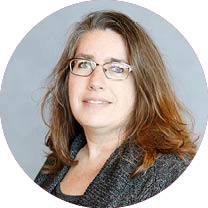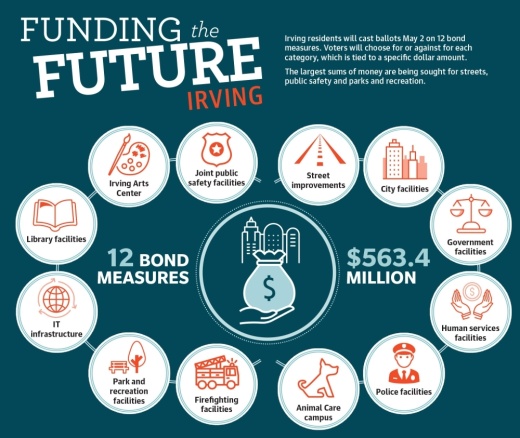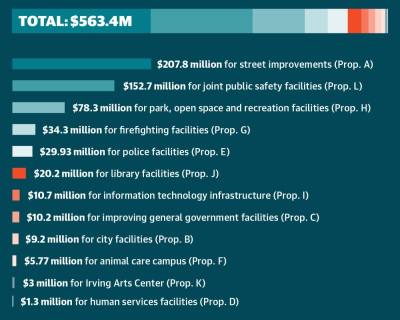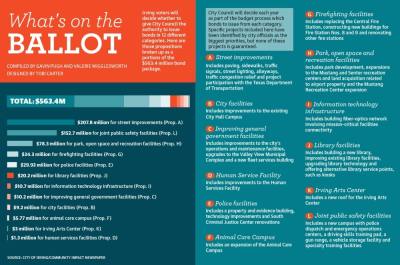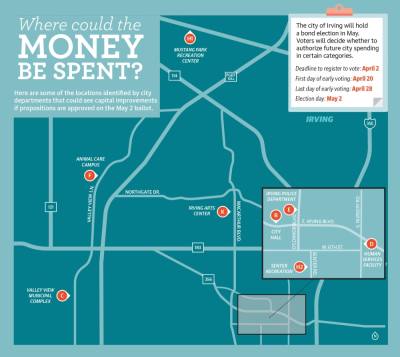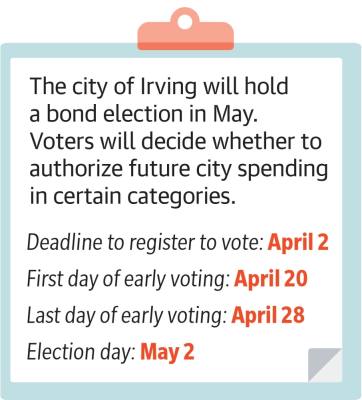The ballot will list 12 propositions totaling $563.4 million. The largest categories involve street improvements, public safety and parks. There are also funds proposed to pay for city building upgrades, a new library and a replacement for the Irving Arts Center roof, which leaks.
“The needs for infrastructure spending in our city are tremendous,” Mark Cronenwett, citizen bond task force committee chair, told Irving City Council. “There’s been a lot of deferral that has been going on, deferred maintenance and construction that needs to be addressed.”
Council Member Wm. David Palmer said at the Feb. 13 council meeting he was pleased to have the projects split into 12 propositions, as people do not always agree 100% of the time. He said he believes this election will let voters choose their priorities.
“It’s not an all-or-nothing vote this time,” he said.
Tax implications
Based on the May election results, city officials expect to spread capital projects out over the next 14 years or so with bonds issued along the way.It will be up to City Council to decide during the budget process each year whether to issue bonds and for how much. That annual budget process will also guide the city’s property tax rate.
Irving Chief Financial Officer Jeff Litchfield said during a council work session in January that he expects no change to the city’s total tax rate of $0.5941 per $100 assessed value as a result of the bond projects.
“We will not sell the bonds unless we have enough money to repay them,” he said.
Bond beginnings
In August, City Council appointed 18 citizens to comb through proposed projects from each city department and decide what was warranted. The bond committee submitted its recommendations in November. City Council then whittled the list down further into what voters will see on the ballot.Sharon Barbosa-Crain, who served as vice chair on the citizen bond task force committee, said she wants people to know that this election is not about voting to issue debt.
“They are voting to give the City Council the authority to issue debt as needed,” Barbosa-Crain said.
The longtime Irving resident said she knows a thing or two about bond elections. She said she has served on every citizen bond committee in Irving since 1980 except for the one in the early 1990s, which was formed while she was a City Council member.
“Ordinarily, committees look at future needs, five years or more into the future,” she said. “Most of the things we looked at were things that are needed very quickly.”
A look at costs
A lot of council’s discussion revolved around what dollar amounts to list on the ballot. The citizen committee used cost estimates for projects based on current prices, but Barbosa-Crain said members knew that projects scheduled to be done in the future would likely have a higher price tag.“[If] you try to build a building eight years from now, it’s going to [cost] a lot more than what you are telling the voters it’s going to cost to build it,” Council Member Dennis Webb said.
Council ultimately decided to list bond amounts based on higher cost estimates for projects expected to be done in future years.
The ballot measures were created based on specific needs. The library facilities measure, for example, includes a proposal to build a new library in the city’s urban center, according to city documents. About 84,000 people visit Irving’s four libraries each month with about half of that usage seen at the northernmost location, the Valley Ranch Library, according to the city. A new library could provide some relief to the Valley Ranch location, Library Director Cary Siegfried told council.
The ballot that voters will see lists dollar amounts only for general categories, which allows the city to have flexibility in case projects change, Barbosa-Crain said.
Irving’s population is approaching 250,000 and will likely top 300,000 or more in the next decade, Council Member John Danish said.
These capital projects will help set the vision for the city in the coming years, he said.
“We have to do this,” he said at the Feb. 13 council meeting. “It’s important for our future.”


